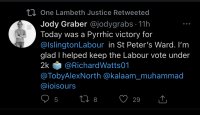I
Green roads ‘may interfere in human rights’ of residents, council admits as it vows to continue scheme
Green roads ‘may interfere in human rights’ of residents, council admits as it vows to continue scheme
Lambeth Council has received a total of £2.64 million as part of Sadiq Khan’s Streetspace scheme to fund 'active travel'
The low-traffic neighbourhood at Shakespeare Road, one of five such schemes introduced by Lambeth Council.
The low-traffic neighbourhood at Shakespeare Road, one of five such schemes introduced by Lambeth Council. CREDIT: GEOFF PUGH
Dominic Penna
25 APRIL 2021 • 6:00 AM
Green roads "may interfere in the human rights" of residents, a council has admitted, but has vowed to plough on with a controversial scheme.
Lambeth Council received a total of £2.64 million as part of Sadiq Khan's Streetspace scheme to fund active travel – more than any other local authority in London.
The Ferndale low-traffic neighbourhood, which takes in five different roads, was established in June 2020, and further restrictions on vehicle access have now been approved after a report concluded the initial trial period was successful.
“The implementation of the scheme may result in the interference with the human rights of individuals,” the report reads.
“Officers consider that such interference is necessary and proportionate means of achieving the wider public benefit of making the borough’s transport networks safe, efficient, inclusive, sustainable and healthy.”
Two sections of the European Convention on Human Rights apply to the Ferndale scheme, the council says.
These are Article 1, which protects an individual’s right to possessions, and Article 8, which protects their right to respect for private and family life, their home and their correspondence.
Both of the articles in question are subject to exemptions which allow a state to “enforce such laws as it deems necessary” to ensure public safety and “the general interest”.
Low-traffic neighbourhoods have been implemented across London boroughs with Government grants
Low-traffic neighbourhoods have been implemented across London boroughs with Government grants CREDIT: HEATHCLIFF O'MALLEY
More than 4,000 residents have signed a petition on the council website that calls for the immediate removal and cessation of all five of Lambeth’s low-traffic neighbourhoods.
Tim Briggs, a Conservative councillor in Lambeth, accused the Labour leadership of “complacency” amid objections from residents, hundreds of whom attended a protest against the plans at Windrush Square on Saturday.
“The reality of people’s lives in Lambeth at the moment is they cannot get from A to B,” he said. “They’re extremely angry, extremely hurt and they’ve lost faith in the council.
“The proposed outcome of lower pollution is not going to happen, because it relies on this idea the traffic is all going to evaporate when in reality it is just displaced.
“There is a fundamental issue of whether the council should be able to infringe on people’s freedoms like this without anyone having been properly consulted.”
Paul Brennan, the chairman of the Licensed Taxi Drivers Association, is among those to have contacted policymakers to express his concerns about the Ferndale low-traffic neighbourhood.
The scheme risks undermining the “essential service” provided by black cabs in the borough, Mr Brennan wrote, “particularly [for] disabled people and those with accessibility needs.”
Other low-traffic neighbourhoods introduced by Lambeth Council include the Railton Road scheme, which has seen eight different access points reduced to two as part of a one-way system designed to enable social distancing.
It comes ahead of legal action by Sofia Sheakh which is set to be heard from June 10. Ms Sheakh has asked a judge to rule that Lambeth Council has illegally introduced its LTNs by not taking into account the needs and rights of disabled people.
Sofia Sheakh, who is taking Lambeth Council to talk over the low-traffic neighbourhood closure of her road
Sofia Sheakh, who is taking Lambeth Council to talk over the low-traffic neighbourhood closure of her road CREDIT: GEOFF PUGH
"My whole life now is rerouted because of these low-traffic neighbourhoods that were not done with any consultation, and they were not done with all the residents in mind,” she said.
“My protected characteristic as a vulnerable person with lung disease has been completely disregarded, and I’m being discriminated against. This is why I am bringing my challenge against the council.”
On Thursday night, Harrow Council became the first in the country to vote to remove all Streetspace schemes, low-traffic neighbourhoods and cycle lanes implemented in response to the pandemic.
It came after overwhelming opposition from residents, with as many as 91 per cent not wanting the borough’s low-traffic neighbourhood schemes to continue beyond a statutory six-month trial period.
Lambeth Council was contacted for comment.



